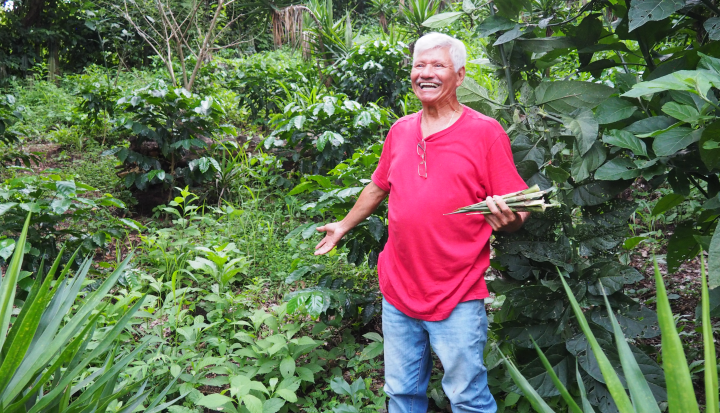For Benjamín Alas, climate change is not a distant threat – it is a daily reality. Government, private sector and civil society leaders gathered there COP29 climate conference in Baku, AzerbaijanBenjamín was engaged in implementing these vital practices to discuss strategies to promote regenerative agriculture. When we attended panels and meetings, he was working on a coffee farm in El Salvador, applying organic biofertilizers to his soil and nurturing shade trees.
Farmers like Benjamin are at the heart of the movement to develop regenerative agriculture and food systems; but often their needs are sidelined in global discussions. As we shift our focus from COP29 to COP30 in Brazil next year, we need to ensure that these conversations are focused on the needs of farmers.
To achieve this, we must focus on five critical activities:
1. Invest in Regenerative Small Farms
Much of the discussion at COP29, and before that at COP28, focused on the difficult topic of climate finance. The Loss and Damage Fund is established and governments are making significant commitments to renewable energy.
But significant divisions remain as developing countries call for a New Collective Quantitative Goal of $300 billion in Climate Finance negotiated at COP29. “small amount” relative to the scale of the problem.
Agriculture, especially small farms, is underfinanced. A recent analysis by the Global Alliance for the Future of Food found that Public climate funding allocated to food systems has fallen From 3% in 2017-2020 to just 2.5% in 2021-2022. Meanwhile, the Climate Policy Initiative reports the adoption of small-scale agricultural systems less than 1% of all climate finance. As a result, many proven solutions in emerging markets are often not funded.
When these farmers receive investment, the changes can be transformative. For example, Benjamín learned the regenerative agriculture techniques he uses today Maximum Opportunities in Coffee and Cocoa in America (MOCCA) project is a unique collaboration between the US Department of Agriculture and many of the world’s leading coffee companies. Using public and private funding, MOCCA has trained more than 120,000 coffee and cocoa farmers and brought more than 100,000 hectares of land under more sustainable management.
2. Integrate Climate, Nature and Land
For farmers like Benjamin, the challenges and opportunities associated with climate, nature, and land are inextricably linked. Practices that improve soil health can also combat erosion, increase biodiversity, sequester carbon, and increase crop yields and sustainability.
However, these issues are often dealt with by governments in silos in three separate COPs: climate, biodiversityand desertification. Typically, companies also divide risk management and investments along similar lines, although this is beginning to change.
By bringing these actors and challenges together, we can uncover synergies, build a stronger business case for investment, and accelerate action that benefits not only farmers, but local communities and nature itself.
initiatives such as Action Agenda on Restorative LandscapesLaunched at COP28 and supported by more than two dozen private sector companies, this integrated approach to governance shows some early promise. Collectively, these companies are working to support four million farmers and transform 280 million hectares in 100 countries.
3. Make Livelihoods the Basis for Change
Small entrepreneurs are critical to the regenerative transition, but this transformation cannot happen at the expense of their livelihoods. Often, policies are designed or implemented to the detriment of farmers’ incomes.
For example, the initial implementation of the European Union’s Deforestation Regulation (EUDR) risked excluding millions of smallholders from market access due to inadequate compliance systems. Fortunately, the European Commission has wisely delayed implementation to address these issues. A decision supported by TechnoServe.
Placing the financial burden and risk of regenerative transition on small entrepreneurs is not only unfair, but inefficient. Practices are only environmentally sustainable if they are financially sustainable.
By adopting a farmer-centric approach, we can simultaneously create solutions that support smallholder livelihoods and advance climate change mitigation and adaptation. With the right systems in place, regulations like the EUDR can promote unprecedented value chain transparency, benefiting farmers through improved market access, better information and improved services.
4. Give Farmers a Real Voice
For effective implementation of these measures, farmers must sit at the table. Logistical barriers and the high cost of participation mean that smallholder farmers, particularly those from emerging markets, are significantly underrepresented at climate conferences.
To create partnerships and initiatives that truly address farmers’ needs, farmers’ perspectives must be included in the decision-making process. Representation is not just a matter of fairness – it is essential to creating effective and efficient solutions.
Inclusivity means that the UN-led COP presidency must work for climate justice through the inclusive participation of civil society, not in favor of fossil fuel expansion and geopolitical profit. important leaders of our society expressed.
5. Shift your mindset to optimism
Finally, while political challenges and dire climate news can be discouraging, we must resist the temptation of defeat. Rather, we must reinforce and build on positive developments. Every part of preventing or reversing climate change makes a difference—for farmers and the planet. Optimism coupled with action is key to maintaining momentum.
“The Game Is Not Over – The Game Has Begun!” There was an outcry from businesses at COP29, and it resonates strongly.
If we can deliver on these five priorities, COP30 can make a meaningful difference, giving our food system a better future.
To make this a reality, like Benjamin, we must roll up our sleeves and keep working.

